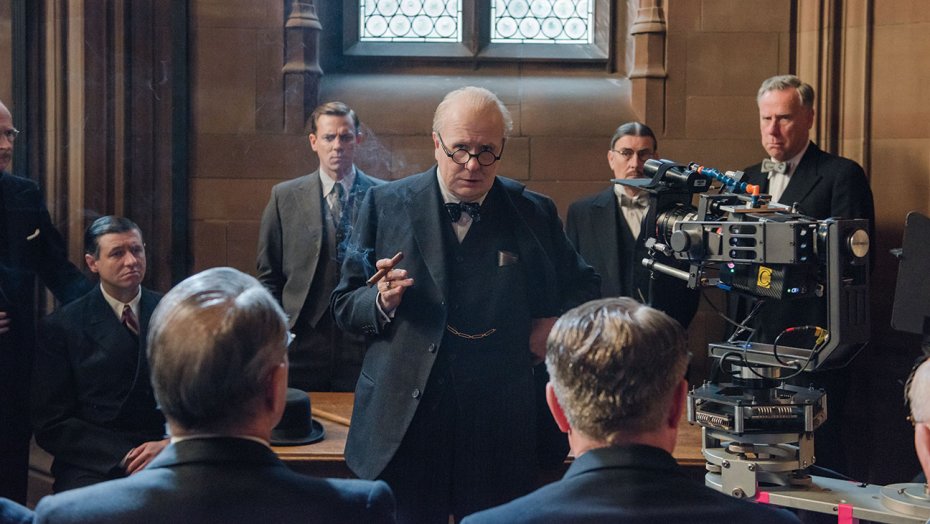The War Room, by Bob Connally
29 Dec
I have long had a fascination with and a deep admiration for Winston Churchill, the man who did more than any other one person to save the world from Hitler and the Axis powers. That fascination and admiration have been shared by a great many filmmakers. In recent years alone he has been portrayed by Bob Hoskins, Albert Finney, Brendan Gleeson, Timothy Spall, Michael Gambon, Brian Cox, and John Lithgow just to name a few. So when there is so much film and audio available of the man and so many portrayals by some of the most accomplished actors of our time how does a filmmaker separate himself with something exciting? Well, Joe Wright accomplished this by casting a living acting legend and arguably the most chameleonic actor alive today, Gary Oldman.
In May of 1940, Hitler has already begun his charge through Europe and is on the cusp of overtaking France. Disgusted with the weakness of Prime Minister Neville Chamberlain (Ronald Pickup, The Crown), Parliament calls for his resignation, with many believing that Viscount Halifax (Stephen Dillane, John Adams) will step into Chamberlain’s place. Much to the dismay of many in Parliament and King George VI (Ben Mendelsohn), Halifax declines, paving the way for a loud, brutish man with a fondness for drink and cigars, Winston Churchill. Having been the loudest (and possibly only) voice in Parliament to speak out against Hitler through the 1930s, Churchill terrifies members of his own Conservative Party by pledging to go to war with Germany, giving no consideration to peace talks.
Wright and screenwriter Anthony McCarten (The Theory of Everything) have not so much made a biopic about Churchill as they have chosen to examine him at a particular moment in his life as Darkest Hour spans about three weeks. In that sense it has much more in common with Lincoln than something like The Iron Lady, as it focuses on the political machinations of Churchill and his many rivals, primarily Halifax and Chamberlain. The film also provides the perspective of the military high command in regards to the evacuation at Dunkirk, something that Christopher Nolan purposefully avoided for his film released earlier this year.
No stranger to Dunkirk himself, Wright’s memorable tracking shot in 2007’s Atonement was technically impressive but much like that entire film, Wright effectively killed the emotional impact by pushing too hard to achieve it. Thankfully he handles the material much better here, telling a fascinating story that moves along at a lively pace while letting the performances carry the emotional weight.
The thought of Oldman playing Churchill is something that I have honestly been excited about for more than a year and it was everything I could have hoped for and more. Because Churchill was such a larger than life figure who was also one of the most well-documented individuals of the first half of the 20th century, it can’t be an easy task for an actor to not seem like he’s doing an impression. There is also the danger of simply overacting but Oldman taps into the sense that Churchill himself was in his own way, something of an actor. His now legendary speeches became that way thanks to his remarkable gift for oratory which stirred the souls of the British people in a dire moment in their nation’s (and the world’s) history. Oldman lets us into the mind and heart of the man in a way that feels unique to the many other portrayals of Winston Churchill in recent years.
The rest of the impressive cast includes Kristin Scott Thomas as Churchill’s wife, Clementine, who while being incredibly supportive is also unafraid of standing up to him when she deems it necessary. There is a delightful warmth and sense of humor in Thomas’ performance that plays terrifically off of Oldman. Many of the best scenes in Darkest Hour involve just the two of them while many of the film’s other best scenes focus on Churchill’s budding friendship with George VI. Mendelsohn is so quietly great in this movie that his work may be overlooked by many when discussing Darkest Hour but it shouldn’t be. There’s a real arc to the handful of scenes he shares with Oldman that is wonderfully entertaining to watch while lending the film quite a bit of heart. As Churchill’s secretary Elizabeth Layton, Lily James (Baby Driver) provides the audience perspective and is really the emotional anchor, able to break our hearts or warm them at the drop of a hat.
There is a key scene late in Darkest Hour that without giving anything away is a bit questionable. While it is evidently based loosely on something Churchill would actually do from time to time, Wright doesn’t completely sell it as feeling believable. Oldman is so mesmerizing in it though that it saves Darkest Hour from potentially going out on a misstep.
Darkest Hour is a highly engaging examination of one of the most important events in human history and of the human who was most instrumental in the deliverance and preservation of the civilized world.
In addition to this film, I highly recommend the Churchill War Rooms to anyone who visits London. A beautifully recreated version of this underground bunker features heavily in Darkest Hour. It is an astonishing living museum where one can walk through the halls Churchill, his family, and the British high command spent their nights during the war. The maps that were used to track ships and troop movements with thumbtacks hang in the same place they hung in 1940. Of the many remarkable places I visited in London the War Rooms were my favorite.




No comments yet